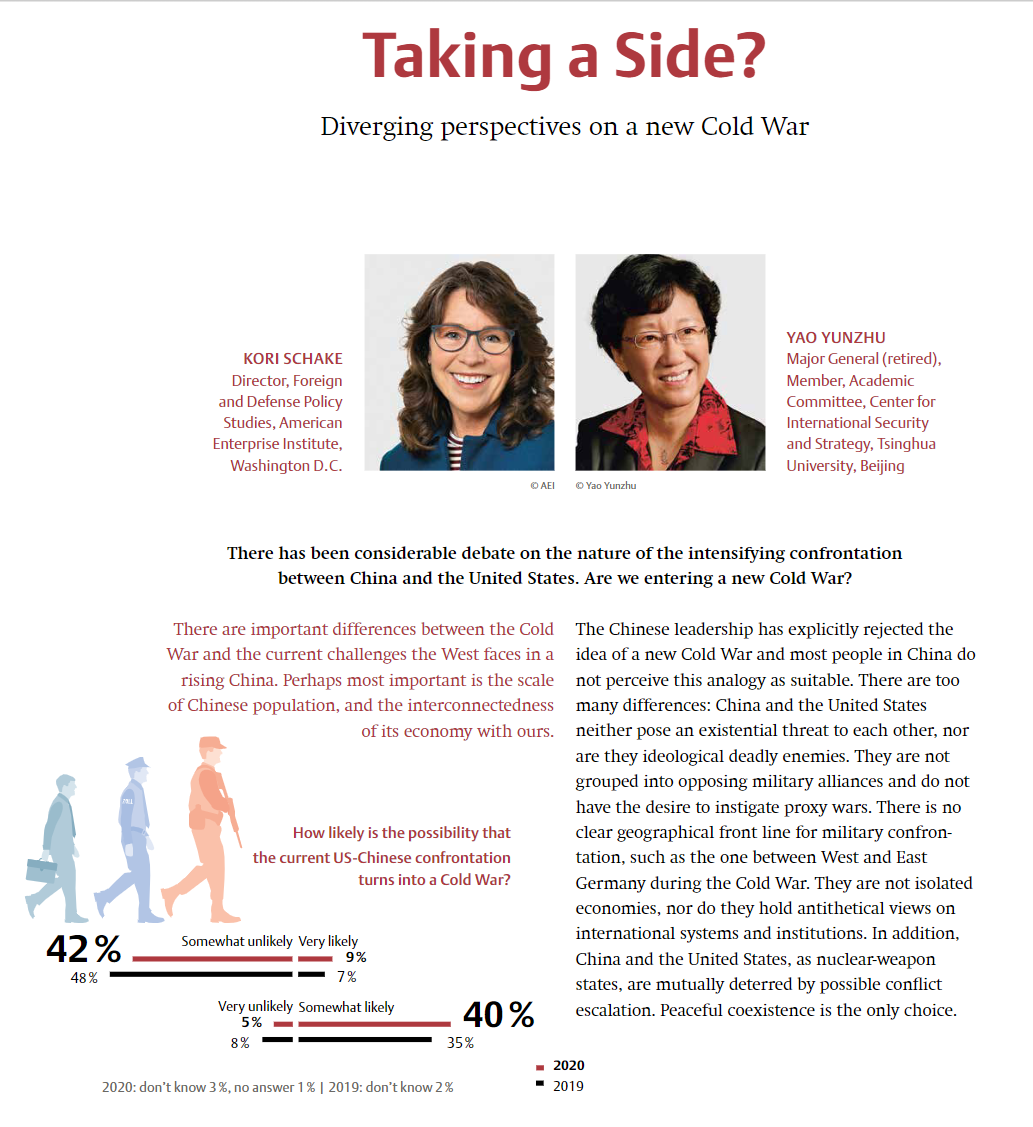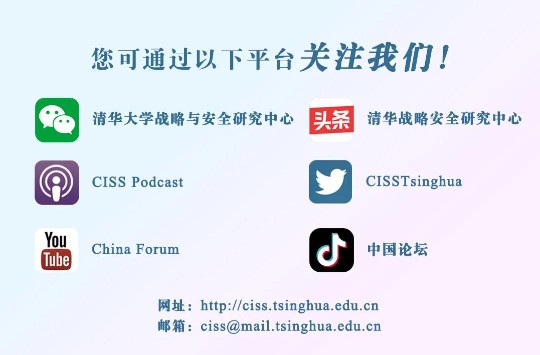导语
清华大学战略与安全研究中心学术委员、中国论坛特约专家、退役陆军少将姚云竹和美国企业研究所外交和国防政策研究主任科里·舍克(Kori Schake),日前就“新冷战”和欧洲角色等七个相同问题,接受了德国科尔伯基金会的书面采访。采访结果以对照形式,发表在基金会年度报告“The Berlin Pulse”上,标题为“选边站?”。
姚云竹认为, “新冷战”这一类比对于当前的中美关系是不恰当的,和平共处是双方唯一的选择。在中国看来,欧洲一直是、并将继续是一支对世界产生巨大政治和经济影响的力量。中国和欧洲的利益是紧密相关的,对欧洲来说的最佳选择,也是中国的最佳选择。
舍克则认为,西方让中国得到了经济繁荣的机会,但中国并不会按照现有的秩序下的经济和安全规则行事。欧洲不会在美中之间扮演中立法官的角色,而是会基于其基本的、与美一致的价值观,做出正确的选择。
CISS公众号转发英文全文如下。

Taking a Side?
Diverging perspectives on a new Cold War
YAO YUNZHU, Major General (retired), Member, Academic Committee, Center for International Security and Strategy, Tsinghua University, Beijing
KORI SCHAKE, Director, Foreign and Defense Policy Studies, American Enterprise Institute, Washington D.C.
1. There has been considerable debate on the nature of the intensifying confrontation between China and the United States. Are we entering a new Cold War?
Yao Yunzhu:
The Chinese leadership has explicitly rejected the idea of a new Cold War and most people in China do not perceive this analogy as suitable. There are too many differences: China and the United States neither pose an existential threat to each other, nor are they ideological deadly enemies. They are not grouped into opposing military alliances and do not have the desire to instigate proxy wars. There is no clear geographical front line for military confrontation, such as the one between West and East Germany during the Cold War. They are not isolated economies, nor do they hold antithetical views on international systems and institutions. In addition, China and the United States, as nuclearweapon states, are mutually deterred by possible conflict escalation. Peaceful coexistence is the only choice.
Kori Schake:
There are important differences between the Cold War and the current challenges the West faces in a rising China. Perhaps most important is the scale of Chinese population, and the interconnectedness of its economy with ours.
2. What is the best way to understand the rivalry between China and the United States?
Yao Yunzhu:
The relationship between China and the United States has changed fundamentally, and neither of them believes they can go back to past patterns of interaction. The changing balance of power, accompanied by changing perspectives of each other made it more competitive, and even confrontational.
Kori Schake:
For twenty years, we offered China the opportunity to become prosperous by opting into the existing international order. We believed that would create a ruleabiding China. As China has grown more prosperous, its political leadership has become more repressive, and the economic reforms generating its prosperity have been choked off. That is what makes China so dangerous. It fears our political freedoms, will not play by the economic or security rules of the existing order, and challenges us with changes that western publics hesitate to risk war over.
3. One of the most important challenges facing Germany and Europe is the question of how to position itself between Washington and Beijing. How do China and the United States see Germany and Europe in the context of this developing confrontation?
Yao Yunzhu:
It is not China’s position to force the rest of the world to choose between China and the United States. China expects European states to make decisions based on their own interest – be they national or European – and with a longterm vision of a global interest we all share. We have to decide whether we want to maintain or destroy the existing international mechanisms when dealing with climate change, international trade and world public health. China holds the belief that our interests are interconnected: what serves the best interest of Europe, will serve the best interest of China.
Kori Schake:
The current confrontation is not simply between China and the United States but a problem all of us are facing. As former Norwegian Foreign Minister Espen Barth Eide said 15 years ago: “China isn’t just rising for the United States, it’s rising for Europe, too.” That is why we see Germany and Europe on the side of individual liberty and consensual, rulesbased economic engagement.
4. If you look at the debate on 5G equipment, both China and the United States have exerted considerable pressure on European states. Are we approaching a situation in which countries such as Germany will have to choose a side?
Yao Yunzhu:
My humble suggestion for European states would be: please give one ear to the United States and another to China, then forget what you just heard and make your own decisions. Europe’s decisions might be in line with the United States, or with China, or with neither of them. There will always be a third, a fourth and more options. Europe is not in a position of choosing side – it is a side for others to choose from.
Kori Schake:
We are long past the point where countries such as Germany will have to choose a side. For all its faults, the United States favour an open internet but China restricts access. Those basic distinctions are driving countries to choose the West. In my judgment, it will be impossible for Europeans to choose to side with a country that has a million of its citizens in reeducation camps based on their ethnicity and religion. That is such an affront to our fundamental values. It just would not be sustainable for European governments.
5. How much weight does Europe actually carry? Do you think the EU or some of its member states could act as mediators?
Yao Yunzhu:
Europe has been and continues to be a great power exerting tremendous political and economic influence and impact to the world. A strong and stable relationship with Europe has been a consistent Chinese foreign policy objective. In addition, China welcomes any role the European countries may play to facilitate a better relationship with any countries in the world?
Kori Schake:
Europe carries a lot of weight when it chooses to. Britain is doing an outstanding job in the past six months by rebalancing its China policy in response to China’s actions, such as the imposition of the national security law to Hong Kong, the market-distorting nature of Chinese government support for their businesses and the security risks of Huawei and other companies. I do not believe China would ever accept the EU or most of its member states as mediators, because it rightly understands them as so closely aligned with the United States. This is due to our common values. Europeans cannot be neutral judges of China. Except possibly for Hungary. I am asking myself, would other European countries feel comfortable if Hungary represented their interests in a negotiation with China?
6. Looking ahead, under what conditions would Beijing and Washington be willing to focus on restoring a more cooperative relationship?
Yao Yunzhu
The US government instigated the recent worsening of ChinaUS relationship. What started as trade frictions has escalated by the United States side into a fullspectrum strife, including technology decoupling, economic sanctions, and restrictions for individuals. In addition, the United States is blaming China for the COVID19 spread and ideologically attacks China’s social system. Unfortunately, China’s repeated call for resumption of dialogues has not been responded positively yet. Therefore, it is the US administration who should answer this question.
Kori Schake:
The ultimate aim of US policy is to channel the Chinese government into complying with the rules of international behaviour that the West promulgated after the Second World War. Conditions for a more cooperative relationship are China ceasing to be a predator toward smaller regional countries and no longer using state power to restrict market access or force intellectual property transfer from western firms. In addition, China would need to comply with international arbitration rulings.
7. Could you complete the following sentence: Should China and the United States ever go to war with each other, Europe will…
Yao Yunzhu:
… act as a force for peace and call for an early end of hostilities. And if I may add, a war is a very remote possibility. However, China’s determination to safeguard its sovereignty and territorial integrity should never be underestimated.
Kori Schake:
… either fight to defend the values of free people, or face a world much more hostile to European interests.
编辑:中国论坛 许馨匀
原文链接:

